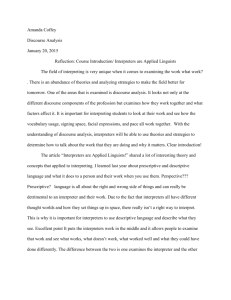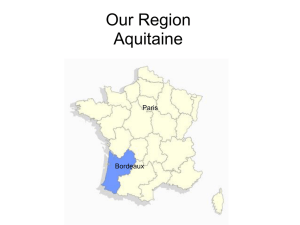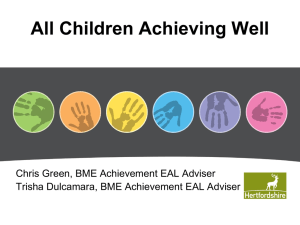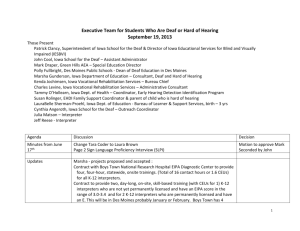Hampshire Young Interpreter pack
advertisement
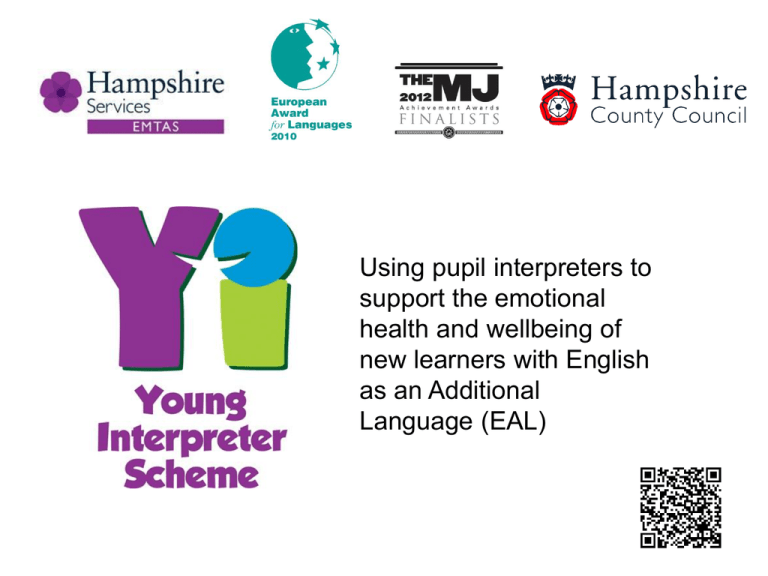
Using pupil interpreters to support the emotional health and wellbeing of new learners with English as an Additional Language (EAL) As a child you might feel… emotional lonely distressed isolated bored confused nervous stressed scared As a parent you might feel… inadequate emotional helpless isolated agitated anxious frustrated distressed scared The Hampshire Young Interpreter Scheme involves… • Training a group of pupils as ‘interpreters’ using the ‘Hampshire Young Interpreter pack’ • Valuing this group by giving them an official role and status within the school • Through this group, providing additional peer support to newly arrived EAL learners either through first language or child friendly English • Working with this group to listen and respond to the needs of pupils, parents and visitors with EAL on a day to day basis • Communicating and celebrating the group’s work with parents and carers • Adding to and extending the buddy system for new arrivals, NOT replacing it • Sending positive messages to all about valuing bilingualism Training Young Interpreters • Guidance pack - differentiated materials for KS1, KS2 and KS3/4 • Reflecting on own use of languages and our qualities • Empathy exercise • How can a YI help? The qualities of a YI • Role-plays Examples of role-plays KS1 KS3/4 A new child has started in your class. You In a design & technology lesson: a new see them on their own at playtime. What student who speaks the same language could you do? as you doesn’t understand the safety rules in the workshop. The teacher asks you to help. KS2 You are working with a child who cannot read in English so you are asked to read them a story. How can you help them to understand what you are saying? What questions would you ask the student / the teacher? What language/vocabulary would you need? What will be the outcome if you do your job successfully? Is there anything else you can do to help the student as well as interpreting? Benefits • • • • • • Helps pupils to develop empathy towards the challenges and difficulties of being a new arrival Supports school staff at different points through the school day (teachers, teaching assistants, office staff, lunchtime staff) Reassures parents/carers New arrivals have more extensive, focussed peer support in addition to buddies Pupil interpreters use their bilingual skills and develop further communication strategies to clarify, explain and ‘interpret’ for new entrants through either first language or child –friendly English This initiative can be used by pupils as young as six years old right through to those attending 6th Form colleges. The varied role of Young Interpreters • Supporting new arrivals on the playground and introducing them to other children. • Checking new arrivals are settling into the school and monitoring how they are feeling on a regular basis. Feeding back to key staff. • Showing visitors around the school, particularly families with EAL. • Supporting EAL learners in the classroom in a variety of ways (being good language role models / rephrasing instructions / explaining in first language or child friendly English). • Communicating with children/ parents/ carers who are new to English to support school staff. • Welcoming parents at parents’ evenings. Older children may be involved in presenting information bilingually / interpreting for parents. •Helping a child new to English to communicate a problem /difficulty Ofsted Comments November 2010 • Those pupils who act as 'Young Interpreters' make an outstanding contribution to enabling those pupils speaking little English and their parents or carers, take a full part in all school activities. • The whole school is rightly proud of the fact that it became the first infant school in the United Kingdom to train pupils as 'Young Interpreters', a strategy which has been outstandingly successful. • Good planning promotes early language and literacy skills well, with all adults taking every opportunity to engage children in conversation. Where their command of English is not secure, the 'Young Interpreters' usually provide excellent support. • We are greatly impressed by how well you learn to be independent and how good you are at taking on responsibility including as school councillors, lunch time helpers and 'Young Interpreters'. The Guidance Materials • A book containing guidance to select students together with lesson plans and resources for training Young Interpreters • A DVD with video clips showing training and interviews • A half-termly newsletter • A Moodle account

